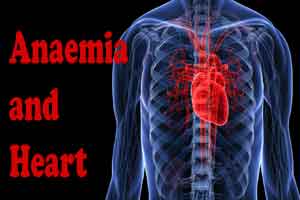- Home
- Editorial
- News
- Practice Guidelines
- Anesthesiology Guidelines
- Cancer Guidelines
- Cardiac Sciences Guidelines
- Critical Care Guidelines
- Dentistry Guidelines
- Dermatology Guidelines
- Diabetes and Endo Guidelines
- Diagnostics Guidelines
- ENT Guidelines
- Featured Practice Guidelines
- Gastroenterology Guidelines
- Geriatrics Guidelines
- Medicine Guidelines
- Nephrology Guidelines
- Neurosciences Guidelines
- Obs and Gynae Guidelines
- Ophthalmology Guidelines
- Orthopaedics Guidelines
- Paediatrics Guidelines
- Psychiatry Guidelines
- Pulmonology Guidelines
- Radiology Guidelines
- Surgery Guidelines
- Urology Guidelines
ACP guidelines on Anaemia in patients with heart disease

Heart Disease is a commonly prevalent disease among Indians and people all across the globe.
The American College of Physicians in their Journal, 'Annals of Internal Medicine' (2013) developed a guideline to present evidence and provide clinical recommendation on treatment of anemia and iron deficiency in adult patients with heart disease. This guideline is based on anemia and iron deficiency from 1947 to July 2012.
Outcomes evaluated for this guideline include mortality; hospitalization; exercise tolerance; quality of life; and cardiovascular events (defined as myocardial infarction, congestive heart failure exacerbation, arrhythmia, or cardiac death) and harms, including hypertension, venous thromboembolic events, and ischemic cerebrovascular events.
The guideline provides two recommendations which run as follows:
Recommendation 1: ACP recommends using a restrictive red blood cell transfusion strategy (trigger hemoglobin threshold of 7 to 8 g/dL compared with higher hemoglobin levels) in hospitalized patients with coronary heart disease. (Grade: weak recommendation; low-quality evidence)
Recommendation 2: ACP recommends against the use of erythropoiesis-stimulating agents in patients with mild to moderate anemia and congestive heart failure or coronary heart disease. (Grade: strong recommendation; moderate-quality evidence)
To read the complete article click on the following link:
Anemia is more common in patients with heart disease. It is present in approximately one third of patients with congestive heart failure (CHF) and 10% to 20% of patients with coronary heart disease (CHD). The cause of anemia in heart disease is not fully understood. Several factors probably contribute, including iron deficiency, comorbid chronic kidney disease, blunted erythropoietin production, hemodilution, aspirin-induced gastrointestinal blood loss, use of renin–angiotensin–aldosterone system blockers, cytokine-mediated inflammation (anemia of chronic disease), and gut malabsorption with consequent nutritional deficiency.
Anemia can worsen cardiac function and is associated with poor outcomes, including increased risk for hospitalization and death, decreased exercise capacity, and poor quality of life. However, it is not clear whether anemia directly and independently leads to these poor outcomes or whether it reflects more severe underlying illness. Treatments for anemia in patients with heart disease include erythropoiesis-stimulating agents (ESAs), red blood cell (RBC) transfusion, and iron replacement, although it is unclear whether these strategies improve outcomes.
The American College of Physicians in their Journal, 'Annals of Internal Medicine' (2013) developed a guideline to present evidence and provide clinical recommendation on treatment of anemia and iron deficiency in adult patients with heart disease. This guideline is based on anemia and iron deficiency from 1947 to July 2012.
Outcomes evaluated for this guideline include mortality; hospitalization; exercise tolerance; quality of life; and cardiovascular events (defined as myocardial infarction, congestive heart failure exacerbation, arrhythmia, or cardiac death) and harms, including hypertension, venous thromboembolic events, and ischemic cerebrovascular events.
The guideline provides two recommendations which run as follows:
Recommendation 1: ACP recommends using a restrictive red blood cell transfusion strategy (trigger hemoglobin threshold of 7 to 8 g/dL compared with higher hemoglobin levels) in hospitalized patients with coronary heart disease. (Grade: weak recommendation; low-quality evidence)
Recommendation 2: ACP recommends against the use of erythropoiesis-stimulating agents in patients with mild to moderate anemia and congestive heart failure or coronary heart disease. (Grade: strong recommendation; moderate-quality evidence)
To read the complete article click on the following link:
Next Story
NO DATA FOUND

Disclaimer: This site is primarily intended for healthcare professionals. Any content/information on this website does not replace the advice of medical and/or health professionals and should not be construed as medical/diagnostic advice/endorsement or prescription. Use of this site is subject to our terms of use, privacy policy, advertisement policy. © 2020 Minerva Medical Treatment Pvt Ltd